#the mainstreams base idea of things
Text
listen I could make this a literal essay but I won't. tl;dr: I don't get why people get so angry about the concepts of demons or monsters being nice. for starters, if you read mythology, demons are pretty fucking chill; it's not all about fucking with humans. plus it's so boring to see the same plot regurgitated in movies and whatnot about evil demons wanting to ruin humans lives or some crap like that.
#look i'll admit i'm a nerd i love mythology and i love things based off or inspired by mythology!#but like...i'll be real. i've got some issues with religion from how i was raised. i don't like mainstream religion#i was raised with the idea of a god who doesn't seem very kind. at least if they're anything like the followers - i'm not interested!#but demonic and pagan deities seem so human. they do good and bad things. they love and they hate. that feels more real to me#of course this is super watered down sparknotes version of this train of thought and everyone's entitled to their own opinions!#but i'm so tired of 'why are the demons nice' or 'i wanted them to be mean' well i don't. even if fictional versions!#the world is cruel already man maybe i want to believe in kind gods. don't care where they come from (though i am pretty biased to be fair)#like...real demons have nuance. they're not all what you'd consider evil. most teach things! i think they're pretty cool imo#anyway. no bothering me with spam messages about proselytizing or 'you're going to hell' don't care didn't ask go away#speech bubbles#ask me to tag
6 notes
·
View notes
Text
you ever think about how mainstream gaming is the way it is bc it evolved from arcade games?
#like the focus on Skill(tm) that values reflexes/reaction time/competition/speed#obvs there's other influences too tho#like rpgs#and then there's a sorta parallel thing going on with early computer games (remember when Computer Games and Video Games were different?)#w people like cyan wanting to make 'video games for adults' lol like myst#and there's always been artsy games and stuff but mainstream-wise i just think sometimes about how like#strange (neutral) it is that you have this medium that's debatably art but also like. not always considered by players or devs to be art?#in a way that books and movies aren't /exactly/ altho there's comparisons to like blockbuster movies for sure#esp bc i think about how the people making a lot of mainstream games were guys who grew up in the 80s/90s and loved 80s action movies#and got to make worlds where you play as those action dudes#like obviously snake who's not even trying to not be snake plissken ghlskdjf#resident evil also obvs#or isaac being inspired by whatshisname in die hard#ther's an implicit power fantasy#but also it opens up interesting artistic/storytelling paths that other mediums can't explore as easily?#isaac is an interesting example of it imo bc of the tension between his ultra-masculine voice/hyper-competence/cool suit#and 1. the survival horror setting but also 2. the fact that he's actually incredibly brittle & the impression#of him we get is based on assumptions when really his independence/determination is a flaw & his 'togetherness' was a facade the whole time#ofc the way it gets expressed in ds2/3 feels like it's still limited by sexist ideas about what emotions men are allowed to express#and how imo#but idk i think it's interesting to play with that#and in an interactive setting you get to do that in a way that other media can't#but back to my original point lol#those are (imo) really interesting things that do get explored sometimes#but like gaming culture at large sometimes feels like it#explicitly rejects reading anything deeper into a game than 'hero shoot bad guy'?#and i feel like in part that comes from what players value and gaming culture puts Skill really high and can sometiems treat story/characte#like set dressing#(obvs there are exceptions)#(and it makes sense i mean. it's a Game it's supposed to be Fun To Play
3 notes
·
View notes
Text
So I accidentally almost got into an argument on Twitter, and now I'm thinking about bad historical costuming tropes. Specifically, Action Hero Leather Pants.
See, I was light-heartedly pointing out the inaccuracies of the costumes in Black Sails, and someone came out of the woodwork to defend the show. The misunderstanding was that they thought I was dismissing the show just for its costumes, which I wasn't - I was simply pointing out that it can't entirely care about material history (meaning specifically physical objects/culture) if it treats its clothes like that.
But this person was slightly offended on behalf of their show - especially, quote, "And from a fan of OFMD, no less!" Which got me thinking - it's true! I can abide a lot more historical costuming inaccuracy from Our Flag than I can Black Sails or Vikings. And I don't think it's just because one has my blorbos in it. But really, when it comes down to it...
What is the difference between this and this?
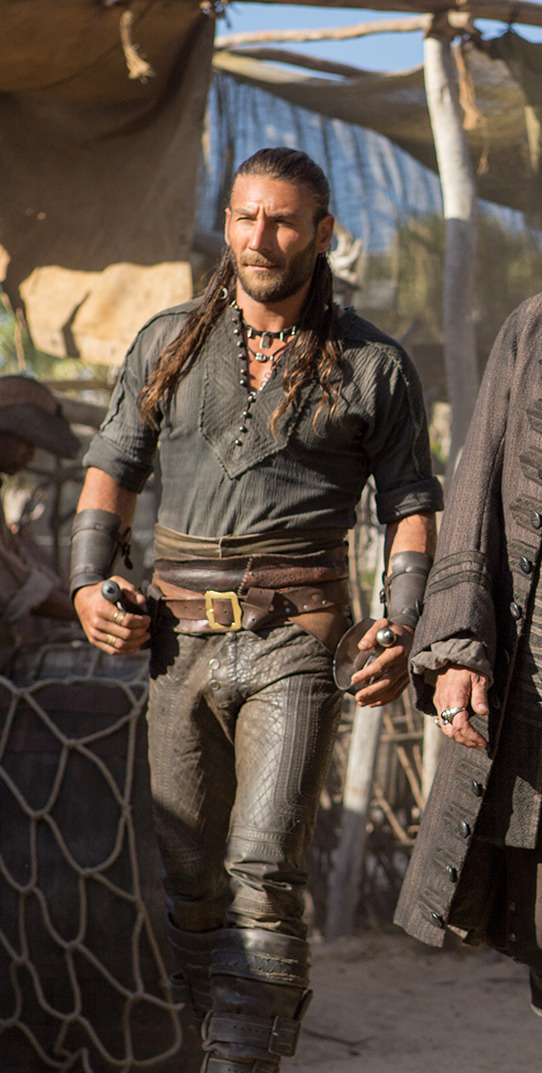
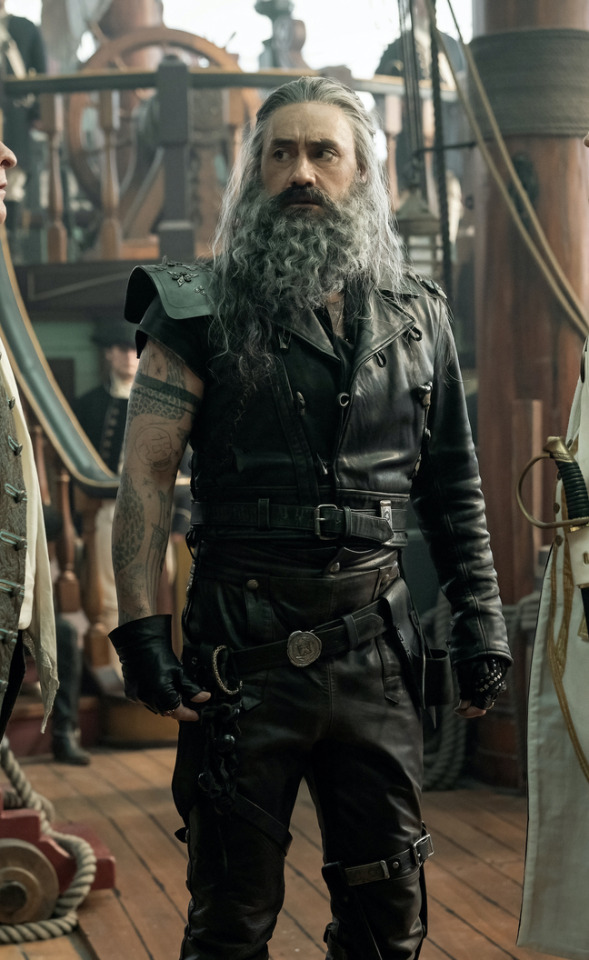
Here's the thing. Leather pants in period dramas isn't new. You've got your Vikings, Tudors, Outlander, Pirates of the Caribbean, Once Upon a Time, Will, The Musketeers, even Shakespeare in Love - they love to shove people in leather and call it a day. But where does this come from?
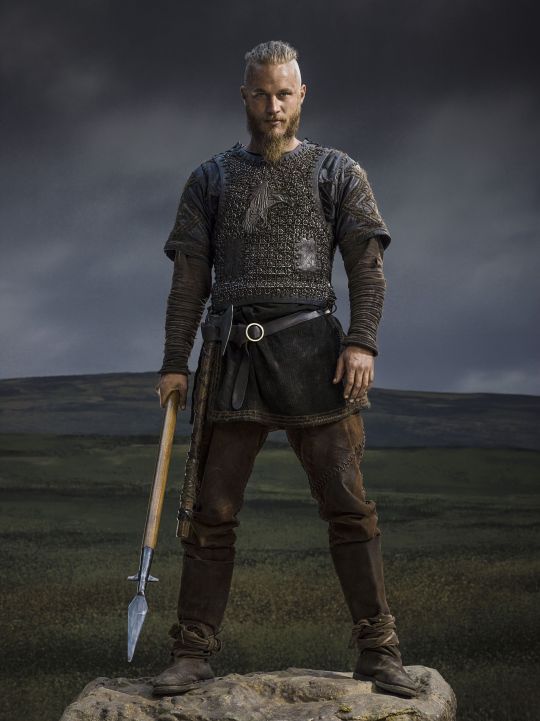
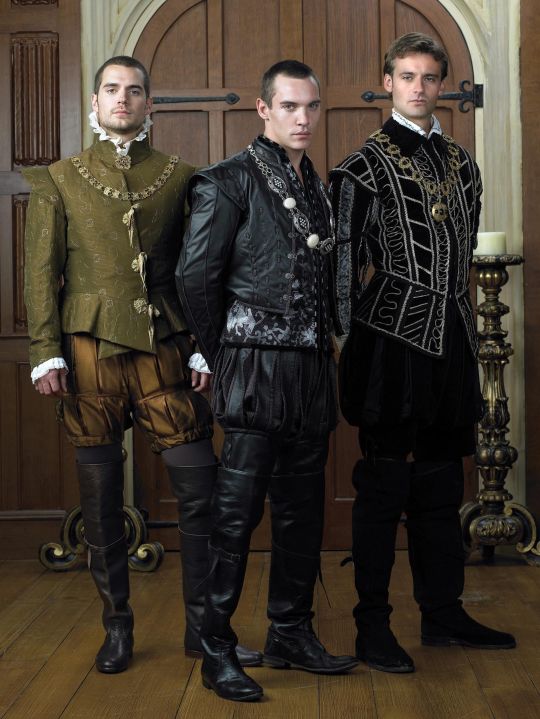
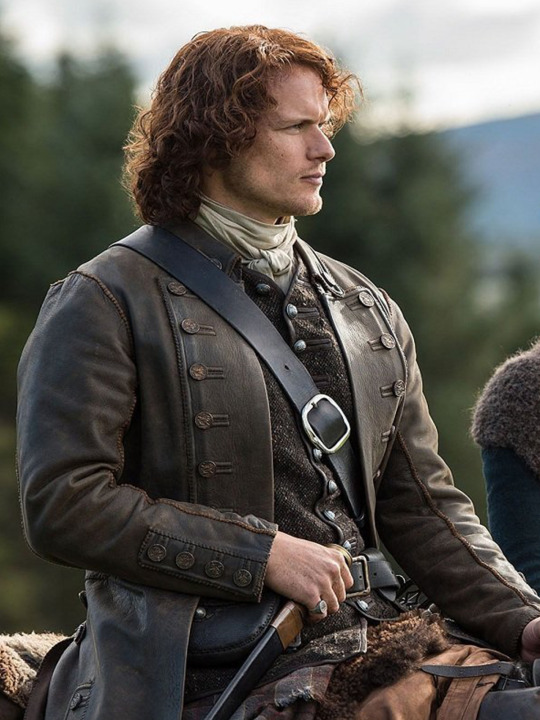

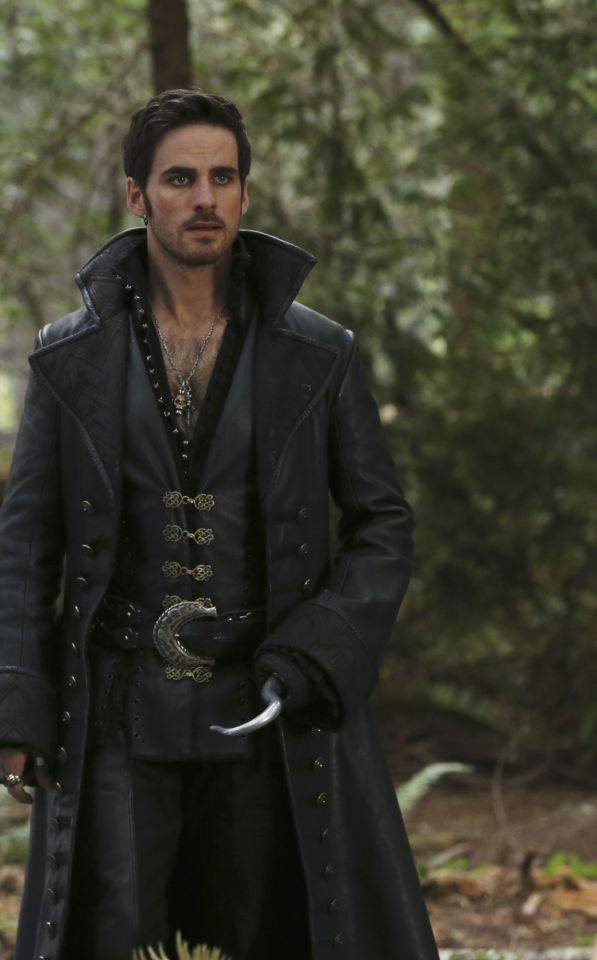
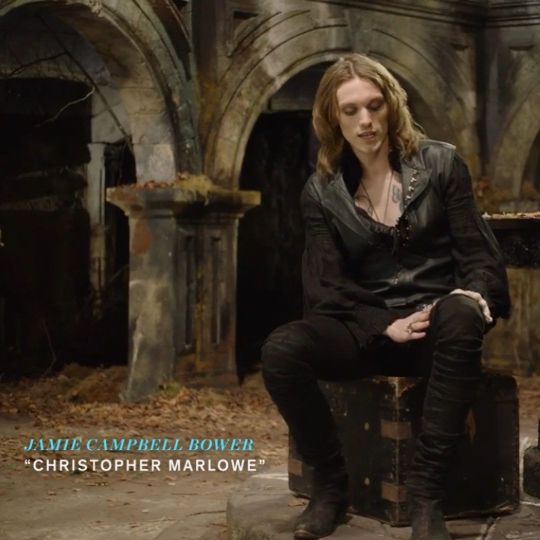
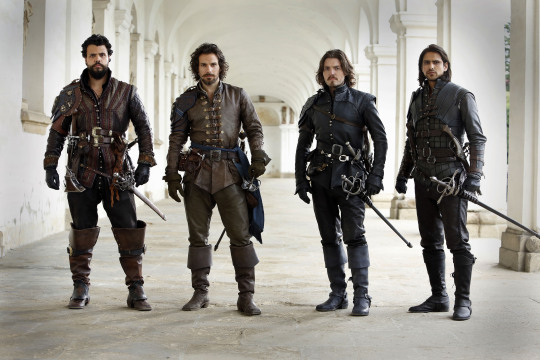
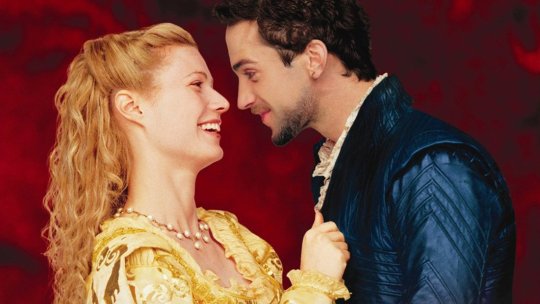
Obviously we have the modern connotations. Modern leather clothes developed in a few subcultures: cowboys drew on Native American clothing. (Allegedly. This is a little beyond my purview, I haven't seen any solid evidence, and it sounds like the kind of fact that people repeat a lot but is based on an assumption. I wouldn't know, though.) Leather was used in some WWI and II uniforms.
But the big boom came in the mid-C20th in motorcycle, punk/goth, and gay subcultures, all intertwined with each other and the above. Motorcyclists wear leather as practical protective gear, and it gets picked up by rock and punk artists as a symbol of counterculture, and transferred to movie designs. It gets wrapped up in gay and kink communities, with even more countercultural and taboo meanings. By the late C20th, leather has entered mainstream fashion, but it still carries those references to goths, punks, BDSM, and motorbike gangs, to James Dean, Marlon Brando, and Mick Jagger. This is whence we get our Spikes and Dave Listers in 1980s/90s media, bad boys and working-class punks.
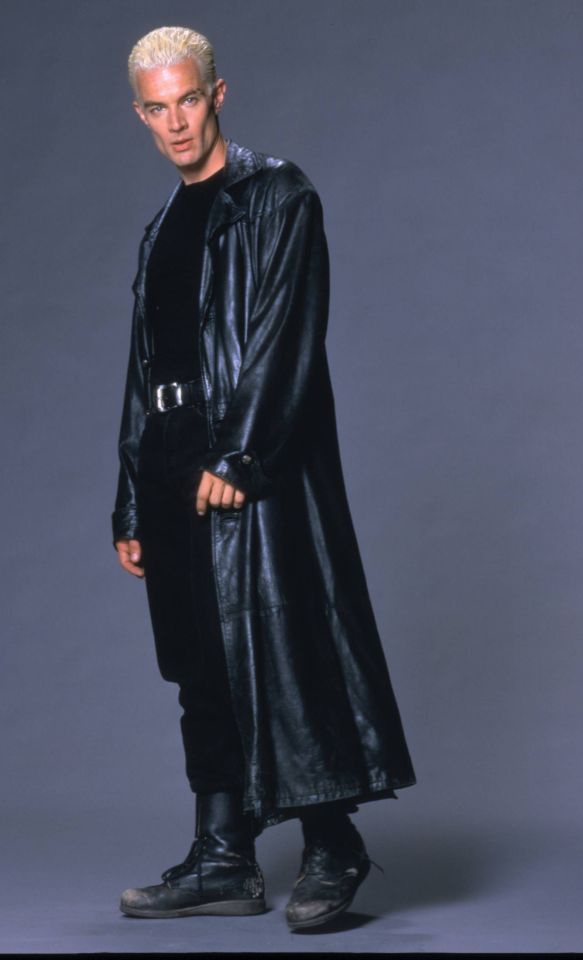
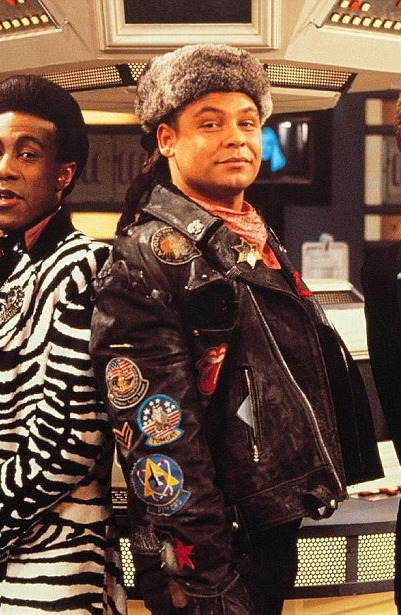
And some of the above "historical" design choices clearly build on these meanings. William Shakespeare is dressed in a black leather doublet to evoke the swaggering bad boy artist heartthrob, probably down on his luck. So is Kit Marlowe.
But the associations get a little fuzzier after that. Hook, with his eyeliner and jewellery, sure. King Henry, yeah, I see it. It's hideously ahistorical, but sure. But what about Jamie and Will and Ragnar, in their browns and shabby, battle-ready chic? Well, here we get the other strain of Bad Period Drama Leather.
See, designers like to point to history, but it's just not true. Leather armour, especially in the western/European world, is very, very rare, and not just because it decays faster than metal. (Yes, even in ancient Greece/Rome, despite many articles claiming that as the start of the leather armour trend!) It simply wasn't used a lot, because it's frankly useless at defending the body compared to metal. Leather was used as a backing for some splint armour pieces, and for belts, sheathes, and buckles, but it simply wasn't worn like the costumes above. It's heavy, uncomfortable, and hard to repair - it's simply not practical for a garment when you have perfectly comfortable, insulating, and widely available linen, wool, and cotton!
As far as I can see, the real influence on leather in period dramas is fantasy. Fantasy media has proliferated the idea of leather armour as the lightweight choice for rangers, elves, and rogues, a natural, quiet, flexible material, less flashy or restrictive than metal. And it is cheaper for a costume department to make, and easier for an actor to wear on set. It's in Dungeons and Dragons and Lord of the Rings, King Arthur, Runescape, and World of Warcraft.
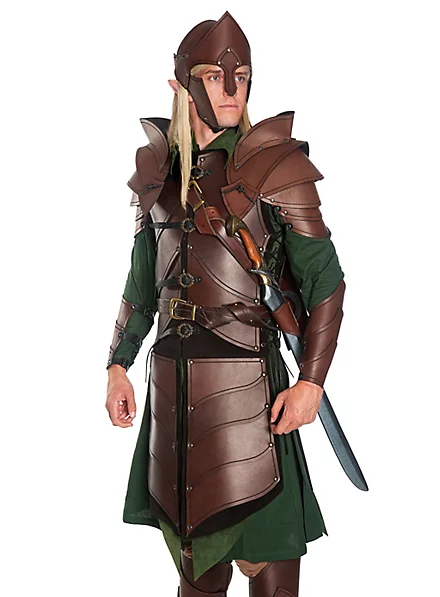
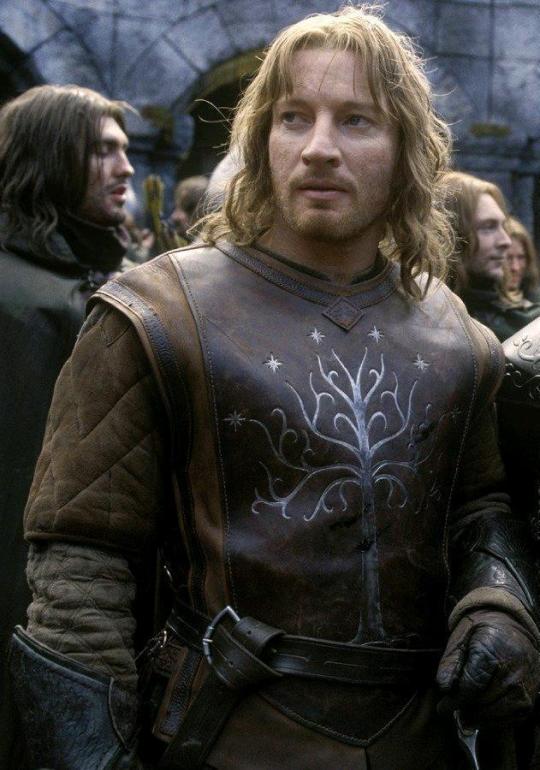
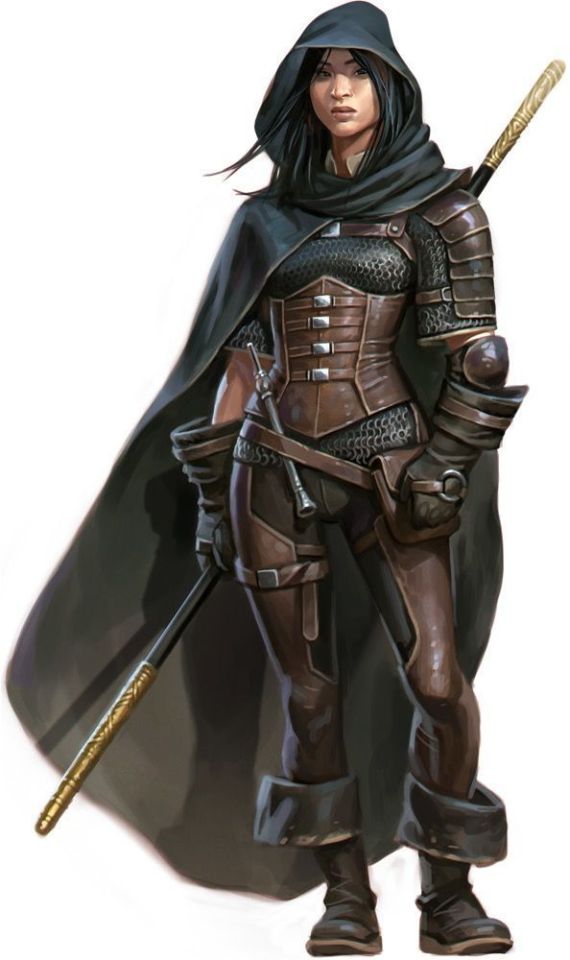
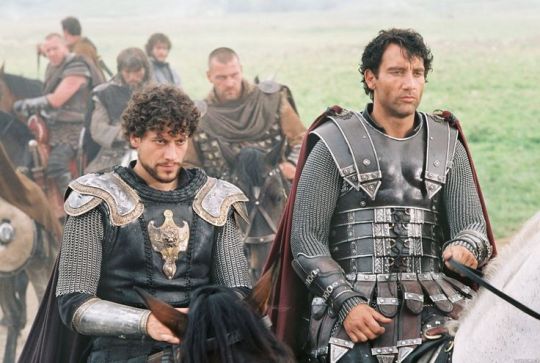

And I think this is how we get to characters like Ragnar and Vane. This idea of leather as practical gear and light armour, it's fantasy, but it has this lineage, behind which sits cowboy chaps and bomber/flight jackets. It's usually brown compared to the punk bad boy's black, less shiny, and more often piecemeal or decorated. In fact, there's a great distinction between the two Period Leather Modes within the same piece of media: Robin Hood (2006)! Compare the brooding, fascist-coded villain Guy of Gisborne with the shabby, bow-wielding, forest-dwelling Robin:
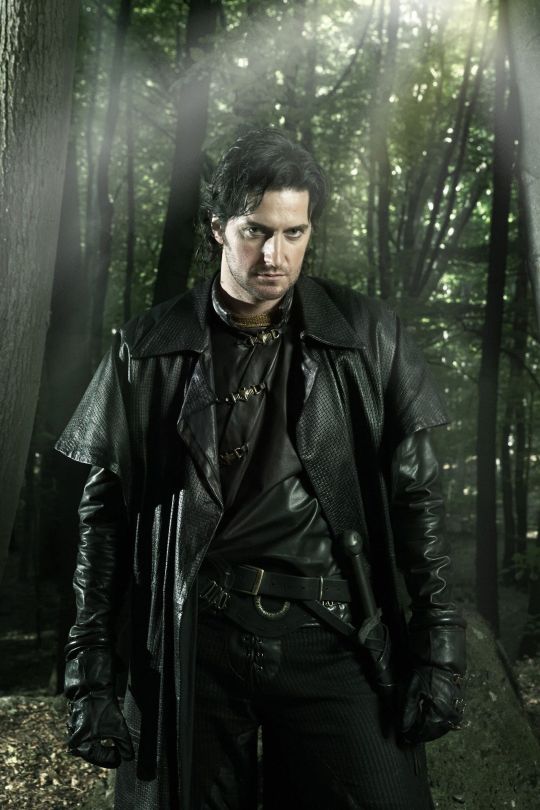
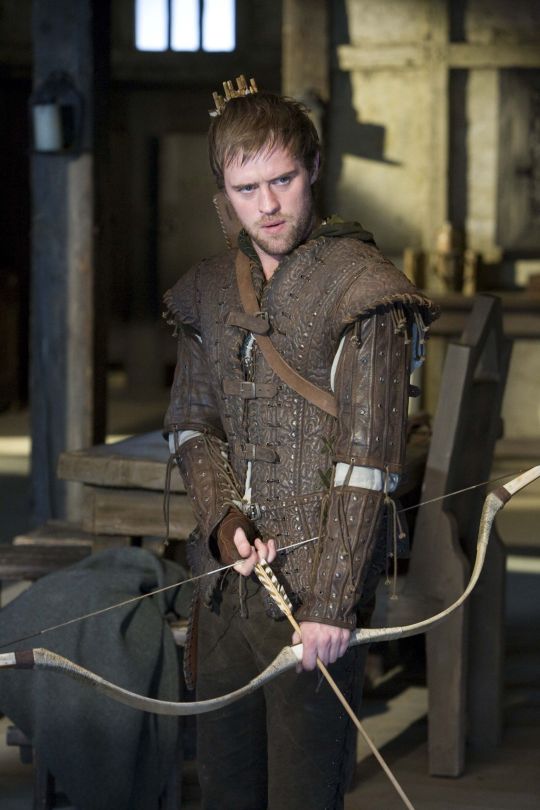
So, back to the original question: What's the difference between Charles Vane in Black Sails, and Edward Teach in Our Flag Means Death?
Simply put, it's intention. There is nothing intentional about Vane's leather in Black Sails. It's not the only leather in the show, and it only says what all shabby period leather says, relying on the same tropes as fantasy armour: he's a bad boy and a fighter in workaday leather, poor, flexible, and practical. None of these connotations are based in reality or history, and they've been done countless times before. It's boring design, neither historically accurate nor particularly creative, but much the same as all the other shabby chic fighters on our screens. He has a broad lineage in Lord of the Rings and Pirates of the Caribbean and such, but that's it.
In Our Flag, however, the lineage is much, much more intentional. Ed is a direct homage to Mad Max, the costuming in which is both practical (Max is an ex-cop and road warrior), and draws on punk and kink designs to evoke a counterculture gone mad to the point of social breakdown, exploiting the thrill of the taboo to frighten and titillate the audience.

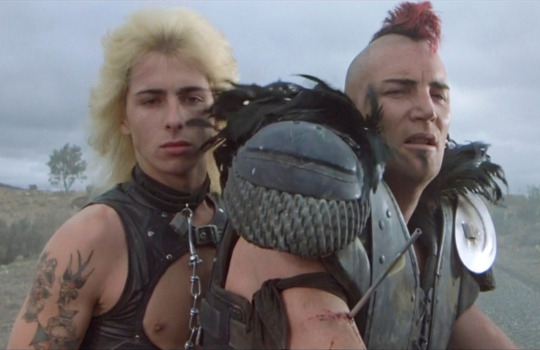
In particular, Ed is styled after Max in the second movie, having lost his family, been badly injured, and watched the world turn into an apocalypse. He's a broken man, withdrawn, violent, and deliberately cutting himself off from others to avoid getting hurt again. The plot of Mad Max 2 is him learning to open up and help others, making himself vulnerable to more loss, but more human in the process.

This ties directly into the themes of Our Flag - it's a deliberate intertext. Ed's emotional journey is also one from isolation and pain to vulnerability, community, and love. Mad Max (intentionally and unintentionally) explores themes of masculinity, violence, and power, while Max has become simplified in the popular imagination as a stoic, badass action hero rather than the more complex character he is, struggling with loss and humanity. Similarly, Our Flag explores masculinity, both textually (Stede is trying to build a less abusive pirate culture) and metatextually (the show champions complex, banal, and tender masculinities, especially when we're used to only seeing pirates in either gritty action movies or childish comedies).
Our Flag also draws on the specific countercultures of motorcycles, rockers, and gay/BDSM culture in its design and themes. Naturally, in such a queer show, one can't help but make the connection between leather pirates and leather daddies, and the design certainly nods at this, with its vests and studs. I always think about this guy, with his flat cap so reminiscient of gay leather fashions.
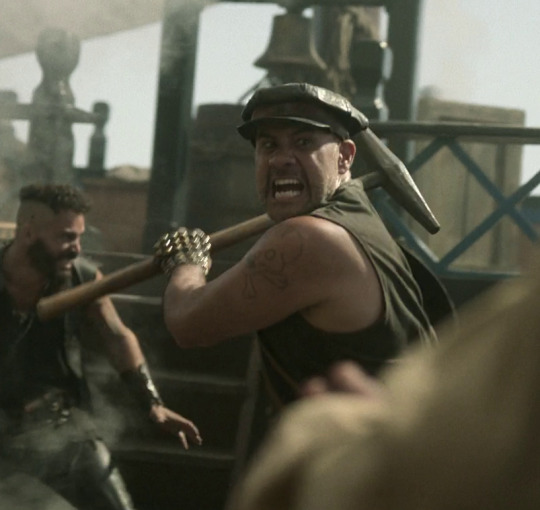
More overtly, though, Blackbeard and his crew are styled as both violent gangsters and countercultural rockstars. They rove the seas like a bikie gang, free and violent, and are seen as icons, bad boys and celebrities. Other pirates revere Blackbeard and wish they could be on his crew, while civilians are awed by his reputation, desperate for juicy, gory details.
This isn't all of why I like the costuming in Our Flag Means Death (especially season 1). Stede's outfits are by no means accurate, but they're a lot more accurate than most pirate media, and they're bright and colourful, with accurate and delightful silks, lace, velvets, and brocades, and lovely, puffy skirts on his jackets. Many of the Revenge crew wear recognisable sailor's trousers, and practical but bright, varied gear that easily conveys personality and flair. There is a surprising dedication to little details, like changing Ed's trousers to fall-fronts for a historical feel, Izzy's puffy sleeves, the handmade fringe on Lucius's red jacket, or the increasing absurdity of navy uniform cuffs between Nigel and Chauncey.
A really big one is the fact that they don't shy away from historical footwear! In almost every example above, we see the period drama's obsession with putting men in skinny jeans and bucket-top boots, but not only does Stede wear his little red-heeled shoes with stockings, but most of his crew, and the ordinary people of Barbados, wear low boots or pumps, and even rough, masculine characters like Pete wear knee breeches and bright colours. It's inaccurate, but at least it's a new kind of inaccuracy, that builds much more on actual historical fashions, and eschews the shortcuts of other, grittier period dramas in favour of colour and personality.
But also. At least it fucking says something with its leather.
#everyone say 'thank you togas' for not including a long tangent about evil rimmer in red dwarf 5x05#Our Flag Means Death#Togas does meta#and yes these principles DO fall apart slightly in s2 and i DON'T like those costumes as much#don't get me wrong they're fun and gorgeous - but generally a bit less deep and more inaccurate. so. :(#I'm not sure this really says anything new about Our Flag but I just needed to get my thoughts out#i hate hate hate Gritty Period Drama costumes they're so boring and so ugly and so wrong#god bless OFMD for using more than 3 muted colours and actually putting men in heels (and not as a shorthand for rich/foppish villainy) <3#looking at that Tudors still is insane like they really will go to any lengths to not make men feel like they've got bare legs XD#image descriptions in alt text#and yes i DID just sink about two hours into those so you'd better appreciate them
1K notes
·
View notes
Text
I always feel so weird when I see companies making mega expensive “punk” and “goth” clothes. I used to know this other person who kept on wanting to get into the goth scene, and another one of my friends literally was so willing to help her and get her started out with like music recs and clothing tips and she’d constantly tell us. “Oh, but dressing goth isn’t accessible for me. I don’t have the money.”
Which y’know makes sense, not everybody has the money to drop on getting goth clothes. Especially when your priorities are literally keeping a roof over your head and paying bills. We’re all from working class families here. But then we just kind of realised she was referring to the shit you’d find on like… Killstar or Dollskill and everything made a lot more sense. It’s been making me think. Ever since alternative subcultures such as goth, such as punk, even grunge tbf have made their way into mainstream fashion trends on the internet it’s made people believe that the only way you’re able to get clothes to “dress the part” is to fork out shite tonnes of money to these ridiculously overpriced online clothing stores. (You don’t even have to dress goth for example to be goth because it’s a music based subculture but that’s a whole other thing.)
The way trends are today with this whole, “aesthetic” thing along with the consumerist HELL that is fast fashion sparks a wave people just buying swathes of overpriced clothing to hop onto a clothing trend that is actually ripped from a subculture they don’t really understand? Like part of the whole core of these subcultures is that we are anti-consumerist and anti-capitalist. You are a fucking joke.
Don’t get me wrong, I’m not talking negatively about people who truly want to get into these subcultures. There is nothing wrong with that at all, of course there isn’t. I’m talking about people who will see a fashion trend and just hop onto it and really have no idea what they’re doing. (This is part of the reason why I believe it’s unlikely we’ll ever have a new subculture as big as previous ones ever again because of just how everything is a trend now.)
Fashion that has been born from these subcultures has always been DIY. Making your own battle jackets, thrifting pieces of clothing and tweaking them to be how you want. Like… I don’t know about you babes but I don’t think goths in the 80’s were getting their clothes from fucking Hot Topic.
The fact that companies are now and have been making ridiculously priced pieces of clothing to capitalise off of: 1.) People who want to hop on trends because they don’t want to make the clothes they just want the style now, and 2.) People who want to genuinely get into subcultures such as punk and goth but may be misguided as to where to get clothing just makes me so fucking mad because it makes getting into the fashion within these subcultures seem inaccessible and consumerist-ridden when they’re absolutely not meant to be.
#long post#word vomit honestly#anti consumerism#anti capitalist#goth#punk#alt subculture#alternative subcultures#goth fashion#punk fashion#i’m sorry if this makes no sense#I just think about it a lot#more than I should to be honest#music#fashion#anti consumption#alternative
1K notes
·
View notes
Note
Hey why DO all those old tabletop RPGS and adventure games have such weird obtuse "act in this one scene or softlock forever" moments? Like, these weren't designed like arcade games that munch quarters... Why was this sort of thing so commonplace?
(With reference to this post here.)
Funnily enough, for tabletop RPGs there's actually a good answer.
If you're familiar with the popular history of tabletop roleplaying games, you've probably heard the idea that they developed out of fantasy wargaming. That's not actually terribly accurate; tabletop RPGs and fantasy wargames are more like two parallel branches that split off from the recreating-historical-battles kind of wargaming at about the same time, and for the first couple of decades there wasn't a bright line drawn between them like there is today. Many are genuinely hard to classify by contemporary standards – there are a lot of early fantasy wargames that look more like modern tabletop RPGs, and vice versa.
One of the consequences of that lack of sharp distinctions between tabletop RPGs and fantasy wargames is that early tabletop RPGs were often played in a sort of "competitive co-op" format at wargaming tournaments. Multiple groups would run their parties through the same adventure in parallel, and be ranked on their performance; sometimes this would involve scoring points for completing specific objectives, or speedrunning the adventure and aiming for the fastest time, but the most popular tournament format was the survival module: adventures which were deliberately designed to be unreasonably difficult, with whichever group's last surviving character's corpse hit the ground furthest from the dungeon entrance being judged the winner.
The upshot of that popularity is that many published adventures early on – and certainly the greater part of the more infamous ones! – were originally written as survival modules, created to be run competitively at a particular tournament, and later repackaged and sold as commercial products. Of course, practically none of them actually explained that; like nearly all tabletop RPG material of their day, they were written under the assumption that all tabletop roleplayers had come up through organised play at university gaming clubs, and thus already had all the context I've just outlined. This ended up causing no end of confusion when the hobby's mainstream visibility exploded in the early 1980s, and suddenly there were folks who'd picked up the rulebooks at their local bookstores trying to teach themselves how to play from first principles with no prior contact with gaming club culture.
As for why adventure games were also like that... well, this is going to sound bizarre by contemporary standards, and I don't blame you if you don't believe me, but once upon a time, point-and-click adventure games were considered the gold standard for Serious Gaming. Unforgiving routing, bizarre moon-logic puzzles, and a bewildering variety of unique ways to get yourself killed off were held up as the mark of the serious gamer in much the same way that janky soulslike combat systems are today, and a large chunk of the genre was made to cater to that ethos. Gamer culture is a hell of a drug!
(If you're about to ask the obvious follow-up question, "what changed?", the point-and-click adventure game's fall from grace and subsequent dismissal as casual fluff tracks more or less directly with a large demographic shift in the late 1990s that saw the genre's player base skewing predominantly female – and, well, you can probably connect the dots from there.)
#gaming#tabletop roleplaying#tabletop rpgs#video games#game design#adventure games#violence mention#death mention#sexism mention#swearing
1K notes
·
View notes
Text
So, I already posted this, but I'll give it one more shot:
I think the view that the reality of The Hunger Games is literally happening right now is so right and probably way scarier than people even realize. When we talk about The Hunger Games, Suzanne Collins literally just reflected real capitalist-caused issues to fit into a dystopian world, but it's literally here, from the most obvious thing to the simplest detail:
How the riches and concessions from the Capital to loyalist Districts made people from 1, or 2, or so on, think of themselves as closer (in nature) to people of the capital than people in the poorest Districts? That's middle-class thinking, stopping them from realizing they're just as pressed by the Capital as the poorest Districts (the guy from 2 in the last movie, saying he wasn't Snow's slave when WE KNOW he is, everyone is?)?
How the electric fence around 12 is THE ONLY THING stopping people from starving to death since they could very well USE the land? That's literally the argument for legalized occupation movements on unused land, like MST and MTST in Brazil.
The use of addictive drugs and the idea of a "war on drugs" in District 6 to control the population and quite literally render them useless to weaponize such an important thing as medical supplies against the Capital (not that this should happen, but still)? That's literally happening in most poor countries in the world, just as much with legalized drugs - like the COVID vaccine (which Africa had and is still having trouble acquiring because of the Global North) - as with illegal drugs like weed, which is used as justification for police to invade favelas in Brazil, kill innocent people (children especially) and brutalize dozens more each time in a war against poor POC in special.
What they did to Finnick, Cashmere, and Gloss? Lemme tell you two words: Epstein Scandal.
The control of the media? Comms people can tell you: media always has a side, it's not bad in itself, but most of the mainstream media is right-wing and/or conservative, and I'm not talking just regionally, but globally, hence what we're seeing at mainstream media trying to hide important news, manipulate or maintain the narrative of equivalence between Israel and Palestine when we know what is happening is a genocide, an ethnic-based genocide.
The dehumanization of the people from the Districts suffer by the people of the Capital? How billionaires see the working class, how white people view POC, how the North looks at Global South countries - that's exactly there, people.
It's literally there.
But we're not the Capital, not entirely at least. It's true that we live in constant alienation caused by the overwhelming amount of content we have to swallow on a day to day basis — Brave New World, hello? — but we, the working class, are also the ones who pay the price of the "Capital's" need for profit without wanting to actually work — we work so they don't have to, even though we should be the ones to benefit from the result of our own work.
#the hunger games#tbosas#the ballad of songbirds and snakes#hunger games theory#katniss is maude ivory's granddaugther#katniss everdeen#peeta melark#katniss and peeta#suzanne collins#coriolanus snow#lucy gray#lucy gray baird#the hunger games the ballad of songbirds & snakes#hunger games books#politics#political thinking#free palestine#free congo#brave new world
556 notes
·
View notes
Note
I will be pulling a wild one here
I am shifter before shiftok and shifting tumbler and so on, I was part of the firsts shifting plataforms to ever exist, the work of my friends and colleagues are diluted and changed in many methods the community still using today, or use and not yet know about it.
Shiftok is a lie. It is straight up a lie, more than half of accounts in there are lying, take the big 10 accounts all around the globe and you will see how deeply unsettling and ego blinded these ppl are.
I will share a lil secret to shifting on tumbler, most influencers KNOW that they are talking shit nowadays. The so proclaimed creators of shittok vanglorizes themselves for creating it, but deep down one was a absolute baby shifter and the other one knew her stuff but was caught in drama.
They both are part of the first shifting community ever, started on 2017, they were warned to use their voice to spread information but they decided to blind themselves and continue their fights and dramas.
Besides that, the modern Mainstream Shiftok is around money. TikTok monetizes creators and for these creators to have a base, they need people to watch their videos
Information is freedom, and there is no way to get the proper amount of needed information on shiftok, it is a short video app, we are discussing a experimental practice on reality switching.
Besides that, people now want to make you pay for shifting info, or manifestions courses, and so on
Let me tell a thing that sadly will make sense in the future: Shifting is free, shifting has always been free and those people do not have authority on the matter to even teach it
While the community has been improving, there is a lack on the shifter vanguard, on ACTUAL new stuff and an actual understanding behind shifting. Some people shift by oversimplifying things, others by hard looking into why's and hows, both are valid but they need to correspond to each other. If a community is too complex shifting becomes too hard, if a community is too simple shifting becomes a myth.
That is the state of the community, anyones out there who wants to understand why's and how's can't even find good bases since everything is gatekept and even the so called shifters from shiftok can't even understand it or desire to share it.
Therefore creating a community that is constantly a lie, people tell experiences that don't match when being re-telled and either make sense, many have been spotted doing so. Shifting changes someone, it is a trace marked on their minds forever, to fully shift is to be forever changed. Most people are either LDs or having false awakenings and calling it a day.
Besides all that people are fighting for stupid ideas. Being taboo, race changing was never a topic in our community before it began on shiftok. You know why? Because everyone knew that infinity selfs does not mean that you are equally in all realities, we all playing roles, if I am certain race in my Dr that is not the one I am in this reality, then I won't act like I am part of the minority in this reality.
As for the hypocrisies of these people, most accounts that moved this debate was being xenophobic on Portuguese and Spanish communities.
As an extra information, If you know Sunni Method, you should know that sunni was one of the first shifters (on our understanding of DR, WR and scripting) that created and sourced so many different shifting practices and helped the first gen of the community to understand the practice. She did not only proved shifting to the subliminal communities as well define a work that would be still being used today, the Sunni method is the basic for every method. And she is afro American, and for today terms, she would be changing her race depending on the reality.
For the people that keep making futile problematization on this topic, it shows that you never fully understood shifting and created fake scenarios on your mind to source a point that was never a actual point. Minorities need support on day to day life, not whatever people are believing on determined practice.
tw: mention on self harm
As for respawning, anti-respawing are a bunch of ungrateful. Respawning made the very much bases of modern shifting. And for the respawners that belief that it should end on self harm, you do not understand how respawning work and how delicate are the structured you about to mess. If you are suffering from any mental difficulties, search professional help and not spiritual help that often leads to bad escapism.
Going back
The individual journey of someone starts on the seed planted by the community they find shifting, the hard truth is that shifting isn't only a personal experience but a collective one. In another words the community state you get, is the seed of your journey. Before 2018 people had a hard time shifting because they could not understand what it was, a few years later the community achieved a gold state with sharing knowledge and methods (which the English community would constantly gatekeek to their siblings communities btw) and after the mainstreaming on TikTok shifting went down to a stone age.
People are debating either if they can or cannot do things. In shifting. The. Belief. Of. Infinity.
I can understand why baby shifters do these questions, but I see people on this community since 2020 and the ones from 2019 who end up on the wasteland of other social platforms, asking questions that are so OBVIOUS
You don't need to know everything, but for star sakes you NEED to understand the basics of the thing you are doing, what a script is and how to write one, a few methods and your own cosmological view settled down.
Shifting allows you to mix and match beliefs like a Lego set, do it for your personal journeys using what other have found in the past.
While people are degrating the community and locking good stuff a way, shifting gets every day harder and harder, becoming everytime a godfied event and a hard and thought task that only a few can achieve, that is the mindset that is being grown on the community.
Why the hell the overall community nowadays have less and less actual experiences that the community a few years ago?
For the future, I am not sure but I bet on the end of the practice in a few years, when outsiders "grow out of it". Some will shift, others will just move on with their spiritual journey and so on, the community slowly fading.
I am not here to bring a salvation message, I am so tired, I have been making so much for the last 5 years, trying so hard to archive, share and teach people about shifting, in a way that was forgotten and locked down.
I am permashifting soon, and I am posting what I know on the community where I learned shifting in my native language, this end up more in a vent and a warning to what is happening. Do not believe me if you do not want to.
As for the people that want to understand more, I really recommend for you to dig in the past, a hint is that shifting started on amino. ik it is a bad app but sometimes gems appears. Shifting predecessors (quantum immortality and dimensional jumping) are available on Reddit to be studied (see the archives version of D.J) but they don't fully translate to shifting. (do not use the reality shifting subreddit)
And leave the damned app that is TikTok, you may be laughing for 3 seconds with some random girl talking about draco, but would be way better to be in your dr. why would you let your mind rot?
Shifting is a spiritual practice sourced on scientific facts and theories, both may be fighting a lot but a thing that they have in common is digging stuff, dig and search like never before, the community and it's beliefs are open on the internet, sometimes all you need is to answer a few questions and you will be able to find a good plataform
Your journey will be good no matter what.
Happy shifting.
.
#reality shifting#shiftblr#shifting realities#desired reality#shifting community#shifting#shiftcourse
280 notes
·
View notes
Note
As someone who hasn't read the works of radical feminists like Simone de Beauvoir, could you explain what's wrong and what bothers you about biological essentialism? I'm curious about your opinion after reading your post on radfems (and I'd like a perspective that isn't so based on biological gender essentialism, which I honestly have a hard time moving away from because I don't understand other perspectives well). 👀
The problem with biological essentialism is that purports to answer the eternally unanswered question of nature vs nurture in a wholly one-dimensional way - ie, with biological sex as The Single Most Important Aspect Of Personhood, regardless of any other considerations - while simultaneously ignoring the fact that biological sex is not, in fact, a binary proposition. We've learned in recent decades, for instance, that intersex conditions are much more common and wide-ranging than previously thought, not because scientists have arbitrarily changed the definitions of what counts as an intersex condition, but because our understanding of hormones, chromosomes, karyotpying and other physical permutations has expanded sufficiently to merit the shift. So right away, the idea that humanity is composed of Biological Men and Biological Women with absolutely no ambiguities, overlap or middle ground simply isn't true.
Inevitably, though, if you mention this, people with a vested interest in biological essentialism become immediately defensive. They'll start saying things like, oh, but that's only a tiny minority of the population, they're outliers, they don't count, as though their argument doesn't derive its claim to authority from a presumed universality. To use a well-worn example, redheads are also a tiny minority of the population, but that doesn't mean we exclude them when talking about the range of natural human hair colours. But the fact is, even if humans lacked chromosomal diversity beyond XX/XY; even if there were no cases of cis men with internal ovaries or cis women with internal testes or people with ambiguous genitalia - and let's be clear: all of these things exist - the fact is, our individual hormones are in flux throughout our lives.
There are standard ranges for estrogen and testosterone in men and women (which, again, vary according to age and some other factors), but two cis men of the same age and background could still have completely different T-counts, for instance - meaning, even the supposed universal gender factor isn't universal at all. More, while our hormones certainly play a major role in our moods and cognition, so do a ton of other genetic and bodily factors that have nothing to do with the sex we're assigned at birth - and on top of that, there's nurture: the cultural contexts in which we're raised, plus our more individual experiences of living in the world.
One of the most common, everyday (and yet completely bullshit) permutations of biological essentialism comes when parents or would-be parents talk about their reasons for wanting a son or a daughter. Very often, there's a strong play to stereotypical assumptions about shared interests and personalities: I want a son to play football with me, for instance, or: I want a daughter to be my shopping buddy. But even within the most mainstream channels of cishet culture, it's understood that these hopes are not, in fact, grounded in any sort of biological certainty. The dad who wants a sporty son might be just as likely to end up with a bookworm, while the mother who wants a little princess might find herself with a tomboy.
We know this, and our stories know this! For the entirety of human history - for as long as we've been writing about ourselves - we have records of parental disappointment in the failure of this child or that to embody what's expected of them, gender-wise. More than that: if biological essentialism was real - if men were only and ever One Type Of Man, and women were only and ever One Type Of Woman, with recent progressive moments the sole anonymous blip in an otherwise uniform historical standard - then why is there so much disparity and disagreement throughout human history as to what those roles are? The general conception of women espoused in medieval France is thoroughly different to that espoused in pre-colonial Malawi, for instance, and yet we're meant to believe that there's some innate Gender Template guiding all human beings to behave in accordance with a set, immutable biological binary?
And that's before you factor in the broad and fascinating history of trans and nonbinary people throughout history - because despite what TERFs and conservative alarmists have to say on the matter, our records of trans people, and of societies in which various trans and nonbinary identities were widely understood (if not always accepted), are ancient. We know about trans priestesses from thousands of years before Christ; the Talmud has terms describing eight different genders, and those are just two examples. All over the world, all throughout history, different cultures have developed radically different concepts of femininity and masculinity, to say nothing of designations outside of, overlapping with or in between those categories - socially, legally, behaviourally, sexually - and yet we're meant to believe that biology is at all times nudging us towards a set, ideal gender template?
There's a lot more I could say, but ultimately, the point is this: people are different. While some aspects of our personhood are inevitably influenced by genetics, hormones, chromosomes and other biological factors, we're also creatures of culture and change and interpersonal experience. The idea that men and women are fundamentally different, even diametrically opposed, at a biological level - that the major separator in terms of our personalities and interests isn't culture, upbringing and personal taste, but what's between our legs - is just... so reductive, and so inaccurate.
We can absolutely have common experiences on the basis of a shared gender, but gender is not the only possible axis of commonality between two people, let alone the most salient one at all times, and the idea that we're all born on one side of an immutable biological equation that cannot possibly be transcended makes me feel insane. According to modern biological essentialism, intersex, trans and nonbinary people are either monstrous, mistakes or imaginary; all men are fundamentally predisposed to violence, all women are designed for motherhood, and we're meant to just hew to our designated places - which, conveniently, tend to echo a very specific form of Christian ideology, but which in any case manifestly fail to account for how variedly gender has been presented throughout history. It's nuts.
287 notes
·
View notes
Note
RE watching thoughts: I’m not 100% sure, but it might be that the whole “I am not my thoughts” is about engaging and identifying with your metacognition MORE than your initial thoughts. Because I get where you’re coming from - what is a consciousness but a collection of thoughts and feelings? But you can also have thoughts about your own thoughts that are more useful for dealing with whatever situation you’re in, I guess. (Random aside - every time I start thinking about thinking about thinking my brain inevitably starts thinking about Tiffany Aching and The Wee Free Men.)
I really should have replied to this ask sooner because it's going to seem like a non-sequitur now (this was sent much earlier in March) but I'm kind of glad I didn't, because I've been chatting with people about this and I think I understand more why there's an emphasis in some therapies on the idea that we are not our thoughts.
(I uh, haven't read the Tiffany books so I'm not much help there.)
I am coming to understand that many, perhaps most, people judge themselves, comprehensively and harshly, based on their thoughts. Perhaps it's just a lot of people who struggle with mental health, but given the commonality of the sentiment I don't know if I'd confine it that tightly; generally it appears that people cannot conceive of themselves as anything other than a binary of good or bad. So many people I've talked to about this portion of DBT, the watching-questioning-identifying thoughts portion, say that it helps to snap them out of a spiral of "I'm a horrible person, I deserve to suffer/die, I can never be redeemed" after they've failed at something, or had a negative thought, or reacted poorly to an unexpected event.
That is not something I've ever experienced. I mean, jokingly maybe, but not in a real, internal sense.
And that's not to brag -- I'm not saying I think I'm a good person, either, because I don't think I'm a good person. I don't conceive of myself in terms of good or bad. I never cuddle my cats and think "I'm such a good cat dad" or forget to feed them and think "I should die now." I have a perpetual morally neutral attitude towards my own existence; my thoughts and actions might trend me one direction or another but I'm aware of the temporary nature of that. If I fuck up I'll worry about who I might have hurt or whether I'll be fired or what's going to happen as a consequence, if I am polite to someone who didn't deserve it I know I was acting kindly in the moment, but I don't make an inherent moral judgement of myself based on that. And it seems like the vast majority of people do. Which you would think would make me feel pretty good about myself, but honestly...I don't know.
A lot of people I know who have ADHD or are Autistic have talked about seeing themselves as other, as alien -- like that one webcomic artist who draws themself with little antennae to indicate they're strange and different. I've always understood why one might do that, but I never felt that way myself, before or after the diagnosis. After all, let's remember, I was The Normal* Child of my siblings, and if I was The Normal One before the diagnosis, why wouldn't I remain Mostly Normal after?
* As ever, I'm using "normal" as a cultural term, to indicate what we think of as mainstream, not because normal is a thing that really exists.
My life has been relatively solitary -- I have friends and family and I love them but I'm rarely part of a large group, I don't spend a lot of time out in public interacting with people, I'm not a big socializer. Before the Adderall, I really couldn't be, I took too much psychic damage from interpersonal interaction, so I chose those very carefully. And now my DBT class has been a rare moment when I'm encountering contradictions to a lot of my assumptions about the way human beings in our society interact, react, and behave. I just...don't fit that mold very well. I think of it as having crossed wiring, not in the sense that I'm faulty but just in the sense that I'm very, very different. Not Normal. It's not exactly a bad feeling but it's certainly not a great one, internalizing the sensation of alienness.
DBT is proving to be a mixed bag but not in the way I or my therapist intended -- it seems to be either things I was already instinctively doing or things that simply do not apply to me. In one way it's disappointing because it means there isn't much help to be had (we're a little over halfway through the course and I keep thinking "Maybe next class will be useful") but on the other hand it's validating that so much of what I came up with myself as unconscious coping mechanisms is literally what I would have been told to do anyway.
Sometimes it's a combination of both, though, which really blows. I guess most people, if they reframe another person's actions, actually find emotional relief in that, and I don't. An example from the class is that if someone is rude to you, you can consider how they might be having a hard day, and be polite in return; that's great, in terms of defusing a situation, and it's something I do a fair amount of. But apparently it's also something that for most people results in feeling less awful about the interaction, and that's not the case for me. Which is why so much of DBT feels to me like lying to oneself. It's not lying for most people.
So, yeah. I'm going to finish out the course and keep trying things with the therapist but I suspect given everything, I might already be at "as good as it gets" in terms of emotional work. Which isn't the worst thing in the world, and there is still the option to try medication that could help, but I think there will come a point where I'm going to have to deal with the fallout of just how different I am, and how that has impacted my life. Might end up a good thing; something I've really been trying to resolve is unhappiness over being unpartnered and highly likely to remain that way, and at least if this provides a better understanding of why, then perhaps I can process that and put it to rest in a way I've been trying to do but not succeeding well at.
So, we'll see. But I find it both fascinating and kind of horrifying how many people can believe they are irredeemably bad, even if the belief is only temporary, simply because they had an uncharitable thought or impulse. It makes me somewhat grateful for the crossed wires, at least.
167 notes
·
View notes
Note
"Why I don't write F/F" thread proceeded just as unproductively as I expected. It wasn't about moralizing about the women not writing F/F, it was a question about why personal reasons for avoiding a configuration aren't reflected in opposite directions by other groups. Unlike race, gender has an almost 50/50 split, there's a scale to the proportions not there for other types of identity category. "The femslash police suck" is a factor I can understand. But why wouldn't "personal reasons I just don't feel it towards this configuration" end up an even distribution across the population? The expectation for women to write about women isn't a moral rule, it's that if you allow the logic "men in control of stories write about men (and that's why more mainstream stories center men)", then the flip side is, well, why people clamor for more women behind the camera and in the writers' room. Either accept the logic for both sides or challenge it for both sides. Instead we have the worst of both worlds, we accept it for one side and challenge it for the other. Where's the parallel universe where this imbalance somehow resulted in a different quadrant being the smallest proportion of ships?
--
Why wouldn't "personal reasons" be even? Because the kinds of issues people face based on their demographic aren't.
But I think the larger factor is how socialization affects choice of hobbies and volunteer efforts. Cis men and cis women, on average, go in for different flavors. The dudes tend to be more bothered by the idea of "not getting anything back" for what feels like work. When they do do unpaid labor, it's often the kind that accrues glory and career prospects rather than less showy social ties. Open source coding projects where they can be important, yes. Writing fanfic, no.
Looking up any analysis of volunteering and unpaid work that makes such-and-such a part of society function will get you a lot of discussion of this gendered difference. It's pervasive.
Of course, this is just a broad trend. Plenty of guys do write fanfic, and when they dominate a fanfic space, we see tons of fic focused on the female characters they find attractive, including f/f fic.
And if you're asking about cis gay men specifically... well... again, gendered socialization means that the issues faced by cis lesbians and cis gay men are not equivalent. The reasons and ways that people employ allegory to talk about things "too close to home" will likewise not be exactly the same. Traditional US gay male culture goes in for drag and for an obsession with Hollywood divas and The Golden Girls. Plenty is being mediated through female personas; it's just not translating into fanfic specifically. But most people making "Leave the fujoshi alone" arguments are not thinking about cis gays: they're thinking about people in messier identity categories.
The biggest difference is not behavior but simply that cis men are a small minority on FFN, AO3, and Wattpad, the three big fanfic archives. (Some ancient FFN research found that it was 78% female, and that's the archive known for having more men!) The places with more cis guys are much smaller and don't get talked about as much by most fandom history and fandom meta types from the AO3 side of things.
The reason cis men's taste in favorite characters isn't being "pushed back against" isn't a double standard: it's because:
Cis men simply aren't that relevant to site-wide trends on AO3
and
2. The reverse pattern does happen all the time with vanishingly little m/m and lots of f/f
You sound like you think we'd make this fanfic-specific argument about pro media. In fact, plenty of queer women are open that they produce original f/f but not f/f fanfic or they produce f/f fanworks but not fic. A lot of the "too close to home" arguments are specifically about the kind of id fuel, naked-in-public vibes of AO3-style fanfic. Writing that is less id-driven may not feel that same way. A given woman might have a much easier time writing a mystery novel about a lesbian detective who never gets laid on page than a steamy f/f bodice ripper.
The parallel universe you ask about exists. It's horny imageboards full of fan art of anime girls.
The reason you sound judgmental and are getting "unproductive" responses is that you're phrasing things as though we're refusing to solve a problem. In reality, we're attempting to analyze the situation that exists. It's a descriptive approach.
140 notes
·
View notes
Text
Thinking about blasphemy and Good Omens right now and I can't help but notice an interesting phenomenon around some discussions I've seen about the Second Coming and Jesus Christ being a character in S3.
Namely, I see much more underlying discomfort around the possibility of the show poking fun at the figure of Jesus Christ than I do with any other prediction discussion or discussion around religion in the show.
On the one hand, I completely understand how poking fun at the Antichrist dogma from Revelations doesn't feel particularly blasphemous, where poking fun at Jesus does. The Antichrist is a stock character of horror at this point. Many more disrespectful teams than Gaiman and Pratchett have played with that story. It's barely even considered poking fun at Christianity to have Adam, the son of Satan, be a good kid in Good Omens. But Jesus is a very important figure to Christians all over the world. There are devout Christians who truly love Jesus and no one wants to be a jerk by just outright disrespecting a figure that is dear to so many.
But on the other hand, expecting Good Omens to not make fun of Jesus is a bit absurd to me. Literally saying, "I don't think the satirical religion show is going to satirize religion because it might upset people." Gaiman hasn't shied away from messing with religion or religious bigots before. He gleefully shrugged off attacks over God being a woman, or Adam and Eve being portrayed by people of color.
The Book of Job is lampooned in Season 2. I know it doesn't feel like it to many people here, but the reinterpretation of the Book of Job in S2 definitely registers as blasphemy on some religious scales. It is satirizing a religious text after all.
Saying that angels and demons fall in love and worse, have that love be portrayed by actors of the same sex could be seen as blasphemy at the very least on the level of saying God is a woman. And by the way, it's not like these religious texts say "God is whatever you want the entity to be" or "God is a woman if that makes you happy". Hell no, the Bible is extremely damn clear on God being male. The official position of the Catholic Church is that God is male. Official Catholic dogma is incredibly anti-female in terms of inherent holiness, women cannot become priests, even nuns are dependent on a priest to deliver the Sacraments, it's a huge deal and they are not planning to change any time soon and it is totally unambiguous.
Making God explicitly female might not seem like a big deal since films like Dogma, another religious satire, did it in the 90s but to True Believes in the official doctrine, that is a form of blasphemy.
Good Omens is by definition a blasphemous work. How offensively blasphemous it is really depends on the devoutness of the viewer. And I find it interesting the extent to which there's something of a knee jerk, "Oh they won't do that!" in terms of further satirizing religion in the show about religious satire. As if Jesus hasn't been satirized in other mainstream movies before like the aforementioned Dogma or Life of Brian.
And here's the thing, my personal opinion is? Blasphemy is good! Blasphemy laws on the books mean it's ok to punish, hurt, or even kill a person for making fun of religion or just doing the religion wrong. Human progress has been frozen in place by blasphemy laws, sciences have progressed when blasphemy laws ease or often while deliberately concealing their efforts from authorities in places where blasphemy laws or laws that were otherwise based on the dominant religion exist.
If anything, I am actually a bit uncomfortable with the idea that Good Omens should hold back on lampooning a figure like Jesus Christ. If devout Christians will make laws that determine what other humans can do with their bodies based on their religion, then their religion should absolutely be open to outright mockery without punishment or ramification to anyone. Of course on an individual level I wouldn't wish to be offensive to someone sincerely religious but at the same time, I am also violently anti-censorship of any kind. And blasphemy and religious mockery are often right at the heart of censorship debates.
The world is a better place when we can openly mock religion.
I'm not going to caveat that as an opinion. Being able to openly and without fear discuss, criticize, and mock religion is an incredibly important part of any free society. The battles over this right have been vicious and bloody and are actively ongoing around the world. Just as an example, anti-blasphemy laws were on the books in Ireland until 2020, there was a huge campaign to have them removed because other countries were pointing to them as an example of why they should keep and exercise such laws.
My point is that I suppose this is something of hyperbole or alarmist or overly strident. I can understand people wanting to be decent about not openly mocking a figure of such importance to so many like Jesus. But quite honestly? I hope Good Omens does whatever it pleases with mocking Jesus. I hope they don't hold back. I hope people remember that being able to mock religion is really important, especially when representatives of that religion are actively trying to clamp down on the rights of others.
And honestly, if religious people are offended they should just not watch or they should develop a thicker skin if they expose themselves to such discourse. Religion and Christianity in particular is an active part of the public sphere. It is worthy of discussion. Public discourse often includes mockery, especially of the powerful and of powerful forces that steer the course of nations, like Christianity.
And I think it's important for Good Omens fans, who are a very progressive group, not to cherry pick and moralize over what satire or blasphemy is permitted. All satire should be permitted. All blasphemy should be permitted. The religious bigots don't care if you think God being a woman is ok but making fun of Jesus isn't. It's all the same, anything but glowing praise is criticism to some of these forces. Open discussion is far more important and yes, that includes mockery, and silly discussions in a silly show about an angel and a demon who avert the Apocalypse and fall in love.
496 notes
·
View notes
Text
It’s funny that Bylers are so often accused of being delusional, because I was at my most delusional when I was anti-Byler.
I spent most of S4 refusing to acknowledge that Will had romantic feelings for Mike, despite knowing damn well what all that love triangle imagery and sad gay pining was implying. I convinced myself it was just bros before hoes drama; that perhaps Will wanted to come out to his best friend but felt nervous after six months of radio silence following “it’s not my fault you don’t like girls!”
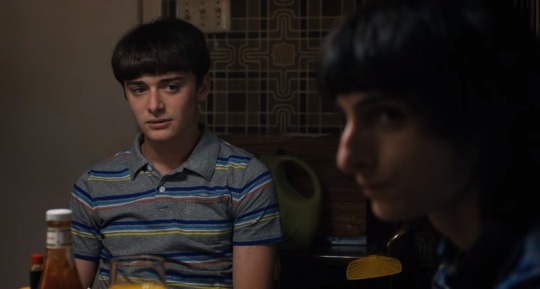
The van scene forced me to accept that he really was in love, and it pissed me off because what was even the point of making him fall for a straight boy?
Mike’s bizarre “no homo” behaviour was clearly a symptom of growing up in a conservative 80s household, and witnessing Will’s sacrificial act of love in the van was the shitty lesson he needed to get over his homophobia.
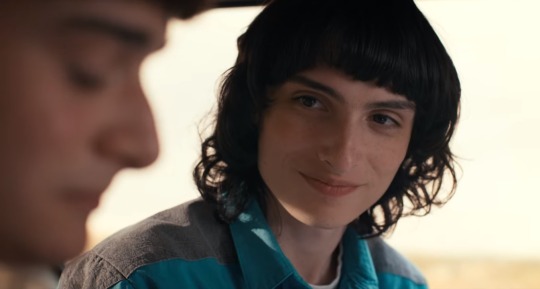
I saw a typical straight male protagonist in an 80s coming-of-age film getting to coast his way to self-actualization on the back of queer suffering; a cruel and homophobic trope I thought we’d moved past by the year 2022.
But then the NINA reunion scene rolled around--

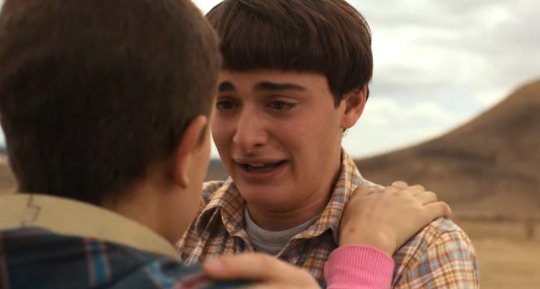
--and I immediately picked up on the heavy parallels between Mike and Will in how they greeted El. The realization hit me like a tonne of bricks: Mike feels the same way about her as Will does.
I thought, “wait, does this mean I was wrong about...? Oh my god. No way.
No fucking way.
Will was in love with El this whole time?? What the fuck, he’s been gay since S1 and she’s his sister this is BULLSHIT I will personally strangle the Duffers--”
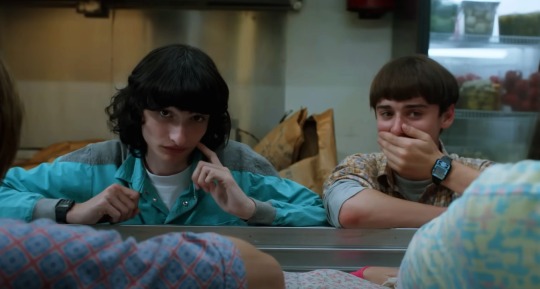
Heteronormativity is a hell of a drug, kids.
Let this be a lesson to those of you who think media illiteracy is to blame for Byler denial -- how well someone understands the mechanics of storytelling is irrelevant if they insist on treating Mike’s supposed heterosexuality as an axiom instead of an evidence-based conclusion. The issue lies with bias, not literacy.
I was stubbornly anti-Byler because I knew I’d immediately fall in love with this ship if I allowed myself to have hope it could be canon, and the general state of queer rep in mainstream media meant I was all but guaranteed to get hurt if I was so stupid as to have hope. But in my desperation to cling to the “safe” heteronormative outcome, I only ended up hurting myself with my own silly assumptions.
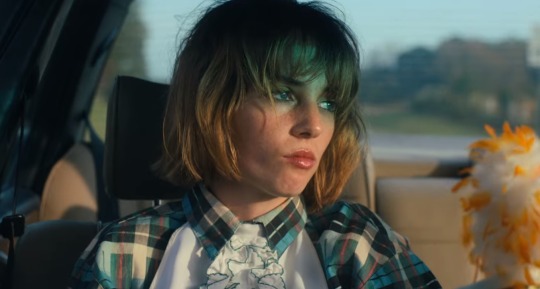
We’ve seen both canonically gay characters in the show make exactly this mistake, needlessly hurting themselves with their silly but self-defensive assumptions about their love interests.
Stranger Things absolutely nails its depiction of the subtler ways internalized homophobia can manifest -- Will may feel like a mistake and be prone to beating himself up, but he isn’t some pitiful self-loathing queer who wishes he was straight, either. He’s just so crushed by heteronormativity that he accepts it as an inescapable fact of life and lets it guide his beliefs and actions.
Don’t get me wrong: Will, like Robin, is very sensible for being cautious in such a horrifically bigoted environment -- trying to openly defy that level of homophobia by yourself, especially when you’re young, is a bad idea.
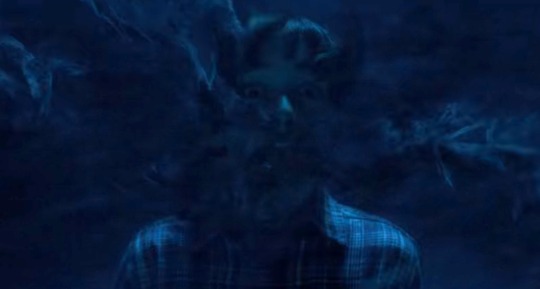
But unlike Robin, he clearly struggles to accept that he has the right to chase his same-sex love interest. He's no longer simply exercising caution, but conforming to homophobic standards -- much in the same way I thought I was sensibly refusing to be queerbaited, when really I was just agreeing with the heteronormative status quo.
I realize now that this is the real reason Will was written into a homophobic 80s trope: not to teach Mike an outdated lesson in acceptance, but to maneuver Will into position for the lesson he’s going to learn in S5 about resisting conformity.
Will needs to learn that castrating himself to make straight people comfortable is a bad idea too. Not only is that a miserable way to live his life, but what sort of world is he leaving for the next generation of queer kids if he never questions these homophobic standards?
It’s just the cycle of abuse scaled up to the societal level.
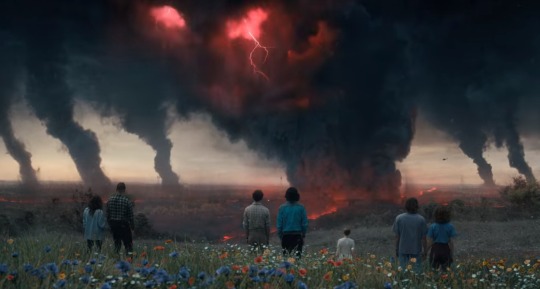
This is what gives me confidence in Byler endgame. Queerness isn’t just an incidental element of Will’s personal arc, but suffuses the show to its very core -- it’s in its themes, its allegory, its characters.
So Will getting the boy isn’t just nice fan-service for Byler shippers, but a necessary ending if the show’s most important lesson is to land:
That it’s rewarding to make the difficult choice of standing up to bigotry in the face of forced conformity. Of choosing love.
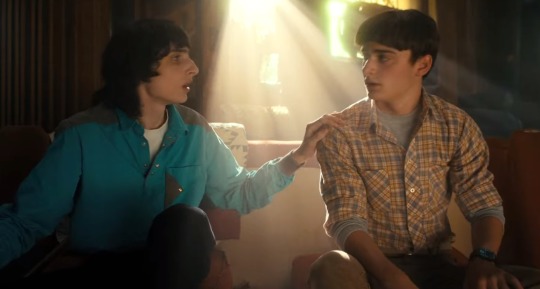
Could it be the case that I was right the first time, and Stranger Things is going to turn out to be yet another heteronormative mainstream show that doesn’t commit to its own themes? Sure, maybe. But that wouldn’t invalidate the valuable lessons this show has already -- and apparently accidentally lol -- taught me.
Anyone who calls us deluded for hoping a mainstream show is going to have a gay pairing as its main couple just doesn’t realize -- or doesn’t care -- that they’re contributing to the very problem they’re describing.
984 notes
·
View notes
Text
For those of you who like the idea of peer respites, I just want to say these are not the only alternatives to the mainstream psych system :] Here's a big ol' list, and many/most of them are peer-run. I live in America, so a lot of this is US-based, but I've tried to make it as internationally accessible as possible!
I'll start with the live-in options. So ya'll already know about peer respites, if you read my latest post about it. There's a few more similar things out there.
Soteria Houses - More long-term (months+) community homes for folks with lived experience of psychosis/similar extreme states, with peer support, that focus on a humane and person-centered approach. Much more freedom & agency than your traditional group home.
Hurdalsjøen Recovery Center - a "medication-free" (aka medication-optional) psychiatric hospital in Norway. Allows patients to choose whether to stay on or taper/remain off psychiatric drugs. Focused on healthy eating, exercise, and recreational therapy options.
Bethel House - Similar to Soteria Houses, a homelike environment in Japan for people with schizophrenia, etc. that focuses on social reintegration.
Organizations, clubs, groups, etc:
Students With Psychosis - A peer support community with programming for students with psychosis
International Map of Hearing Voices/Intervoice networks - Non=pathological support groups for people who hear voices, see visions, etc. US directory, UK directory.
Clubhouse International - Gives people with mental illness opportunities for friendship, employment, housing, educational, and medical services all in one place. Founded by a group of friends who survived a psychiatric hospital together.
Project LETS - A radical approach to peer support and healing that has a disability justice centered approach, giving people with lived experience a voice and focusing on mutual aid. They provide peer mental health advocates, self-harm prevention, and more.
The Mad Society of Canada: A grassroots community of practice that brings together folks who want to provide non-coercive, ethical, survivor-informed mental health services/policy.
Power to the Plurals: Resources and events for people who identify as plural/multiple/systems.
The Wildflower Alliance: Grassroots peer support, training, and advocacy community based in Massachusetts.
Alternatives To Suicide (Alt2Su): Peer support groups that allow people to talk about suicidal thoughts without fear of being committed to the hospital, etc
Trainings:
Intentional Peer Support = Trauma-informed peer support training
Emotional CPR - Trauma-informed mental health support training program for the layperson
Hearing Voices Curriculum: Targeted towards mental health professionals to better understand the experience of hearing voices. Warning: It's expensive!
Cities that have a particularly awesome way of dealing with folks in crisis/with mental illness/etc:
Geel - a farming community where residents welcome people suffering with severe mental illness/distress into their homes and live with them, share work, etc (Edit: apparently Geel is a small city with like 40,000 people and not a farming community lol, I was misinformed. Thanks to @roxbot for the correction!)
Trieste - a city with a community centered system of care that integrates housing and peer support
Warmlines (generally run by peers) and Crisis Lines that don't call the cops: (Most of these are taken from this post by trans-axolotl on Crisis Lines)
Trans Lifeline: 877-565-8860, 24/7
BlackLine: 1 (800) 604-5841, has texting options
The Plural Warmline (No number, check the site)
THRIVE: text message line at 313-662-8209, 24/7
Promise Resource Network: (833) 390-7728, 24/7
Project Return Peer Support Network: (888) 448-9777 English or (888) 448-4055 Spanish, hours are Monday through Friday 2:30 PM to 10:00 PM PST and Saturday and Sunday 10:00 AM to 6:00 PM PST
Wildflower Alliance Peer Support Line: 888-407-4515, hours are 7pm to 9pm EST Monday through Thursday and 7pm-10pm EST Friday through Sunday
Key Consumer Organization: 800-933-5397, hours are 8am - 4:30pm EST, Monday - Friday.
MBRLC Peer Support Line: 877-733-7563, hours are 4 pm-7:45 pm EST every day.
US Warmline Directory (unlikely to call cops, but check with the individual line first)
Misc:
CommonGround software - A software developed by Dr. Pat Deegan (an individual who was diagnosed with schizophrenia) that allows clients to communicate their needs to their doctors more efficiently to support shared-decision making with medication.
Open Dialogue- An psychosocial approach to psychiatric services that focuses shared decision-making and dialogue between client, providers, and family (if the client wants family involved), and often more minimal use of medication.
Integrative Psychiatry - A holistic form of psychiatry that focuses on nutrition, exercise, therapy, and psychosocial factors, where medication is just an aspect of treatment. US database of integrative psychiatrists here.
I will also give a somewhat honorable mention to Mobile Crisis Teams. They are a fairly new alternative to the usual "call the cops on your local mentally ill person". They are composed of nurses, therapists, social workers, occasionally peer support workers, etc. They hook the individual up with support/resources - which can often mean forced hospitalization/forced treatment FYI - but it is a step up from being killed by cops. Look up "[city] Mobile Crisis Team" to find out if there is one in your city.
A note: Something being on this list =/= it is perfect, just that it is an alternative to what we've got. So don't come at me, lmao. Feel free to add on if you know of anything else!
#long post#VERY long post lol#mental health#psychiatry#psych critical#psychiatry critical#psych wards#mental illness#neurodivergency#police brutality#antipsych#antipsychiatry#anti psychiatry#peer support#oh i'm gonna write a book on all this stuff btw uwu#WHAT ELSE CAN I TAG THIS WITH SO IT SHOWS UP FOR PPL???
694 notes
·
View notes
Text
meta talk. i don't quite know how to word this properly, but adding french creators to the qsmp is the riskiest thing quackity studios could've done and it doesn't surprise me that the success to which it was executed was minimal.
adding portuguese speaking creators exclusively from brazil as the first batch outside of the initial english and spanish speakers was the perfect "soft expansion" for the server when you consider the reason for the project's conception - because quackity had experienced poor treatment from white americans as a bilingual latino creator and sought to unite his two communities in an empowering way, further expanding this very noble and personal idea to encapsulate all communities and all languages spanning across the entire world. inviting more latino creators who have likely had the same experiences and would be able to appreciate what the project is trying to achieve is a no-brainer.
it's an uncomfortable thing to touch on (which is why i've never, ever, seen it spoken about on this website), but minecraft projects and communities have always had massive problems with all forms of bigotry, but especially racism. white americans and white europeans have probably not felt the euphoria of seeing their culture celebrated in mainstream global entertainment projects as they already absolutely dominate the entertainment industry on a global scale. as someone who is visibly brown and living in europe, i've always got a lot of grief from classmates and co-workers in the form of ignorant jokes and flat out exclusion - it's an unfortunate cultural norm that bleeds into streaming due to the medium's casual and open nature, unnoticed or unchallenged by white viewers who don't want to have to confront a content creator's bigotry in fears of having to stop watching them. something that cannot be ignored by the people it's actually affecting. there is a reason dsmp and hermitcraft cosplay meet ups are dominated by pale skin.
i love the qsmp because its inclusion of latin american creators and quackity's selectiveness based on personal experience have largely (and i do mean largely, not entirely, but that's a discussion for another day) eliminated that problem.
the most prominent and succinct example i can think of is the photo of quackity's bedroom that was mocked countless times by his english speaking community and his bigoted english speaking friends when he streamed on the dsmp - when that photo was brought to the qsmp, forever, a fellow latino creator, was the first person to gently offer solidarity because he had come from the same impoverished latin american background. to me, and to a lot of minorities, that is what the qsmp is about. yeah, sharing languages in a minecraft server is novel, it's a fun way for americans who did poorly in high school to get back into learning spanish, but it stands for so much more when you're a racial minority. when your pleading in the dsmp fandom was drowned out and ignored for the entire duration of its run. when you're completely unrepresented in minecraft tournaments, and when known bigots are encouraged to participate in said tournaments to boost viewership because numbers are paramount. when you are finally seeing your culture appreciated rather than mocked on streams with tens of thousands of viewers all over the world as part of a massive project with a brilliant, engaging story.
it was obviously necessary to branch out of the americas at some point with what the project is attempting to achieve, but such a task is daunting when the next group you're inviting and their community probably do not have the capacity through personal experience to appreciate what the project stands for at its core in the same way the first batches do. can non americans all relate in discussions of the internet and entertainment industry being america and by extension english speaking centric? yeah, of course. but can white europeans relate when the only representation you have in said media revolves around harmful bigoted stereotypes? can there be a quiet solidarity between a white frenchman and a brown brazilian based on experiences with government, racial profiling, and online mockery? no. and in the landscape of livestreaming stupid jokes for entertainment alongside fast paced gameplay, these nuances are probably not going to be acknowledged.
in complete contrast to the solidarity exhibited between quackity and forever when discussing their poverty growing up in latin america, i have not forgotten and never will forget aypierre excusing his constant racist jokes aimed at the brazilians on his uniquely "french dark humour" that the brazilians, hurt by his comments, could "not understand." this is not an excusable cultural difference, but a symptom of white european privilege, and total ignorance towards what the project is meant to stand for. a smooth integration of all the world's cultures necessitates white european and white american introspection in a way that i haven't seen a lot of streamers capable of. admitting fault to such a degree and the ego of a large online personality do not often mesh well.
i'm always very irritated when people (especially english speakers) complain about them not "adding the germans" sooner despite us seeing applications for german speaking admins many months ago - because it would not be a task of simply throwing out server invites to content creators and cobbling together an animation of a submarine crashing into the island. you cannot downplay the ambition of this project and the mammoth task its trying to accomplish. people take for granted and forget that this is an unprecedented melding of cultures that would never otherwise interact and clash on the rare occasions they do. the french qsmp community being small and the french creators largely being outliers when it comes to the qsmp is not something born out of malice or purposeful exclusion, but simply a symptom of an unspoken lack of solidarity and inability to meaningfully relate based on everything from wildly varying privilege to global placement.
and don't get me wrong - i'm not excusing things like the times at which events are broadcast (i literally live in europe and have to stay up until sunrise to see most events, i think the admins do have to bite the bullet and begin structuring events around a new timezone that isn't the globally inconvenient unsustainable PST), or the exclusion of clips from french content creators at the presidential dinner, but i think attributing those admin choices to the brazilian community being unfairly favoured is downplaying what the qsmp as a project means for minorities, especially when the brazilian community receive the most scorn for infamously being the first to call out bigoted behaviour from qsmp content creators. yeah, it sucks that the french haven't slotted into the qsmp as well as the brazilians and aren't anywhere as numerous, but with all these unspoken contributing factors being taken into account, i can't be surprised.
i wish quackity and his team the best in smoothly integrating more languages and cultures in this amazing project in the future, but for the love of god please understand that the implications of this project and its impact are far larger than any streamer "drama" you might've witnessed in the past. and stop underplaying what this project is trying to achieve in an online landscape saturated in bigotry.
#sorry if this is worded weirdly im still recovering from a brain injury. ill fix typos as and when i notice them reading back on this#also dont tag this as discourse because its like.....not. and thats so unhelpful in recognising what im trying to get across#edit: ive seen a few people bringing it up now YES dont worry i am aware that etoiles isnt white thats why i made sure to specify white#when talking about where the issues were coming from#mine#qsmp
348 notes
·
View notes
Text
I think part of the reason that terfs and redpillers (by which I mean the, shall we say less egalitarian strains of MRAs) are able to win so many converts is that many of their critiques of mainstream feminism are actually valid. Because mainstream feminism (and by extension, mainstream trans activism) is a weird, lurching, awkward Frankenstein monster cobbled together from several conflicting schools of thought stitched together with "common sense" attempts to appeal to normies. Also it's not internally consistent. Ask two feminists what it means to be a feminist and you will get two completely different responses.
Terfs and redpillers point out the obvious flaws. They say things like "people do not have some kind of magical ineffable gender essence inside them that's completely separate from both socialization and biology" or "feminism constantly downplays the ways that men are disadvantaged in society and refuses to admit that women might have any gender-based privilege" and it feels to onlookers like someone is finally daring to point out that the emperor has no clothes. Because that's kinda the case. And the onlookers are then primed to accept the ideologies that these folks are peddling, even though those ideologies are as bad as or worse than mainstream feminism. Because they think, "Well, if the other guys/gals are wrong, then these ones must have the Real Truth."
People don't like to do the work of picking and choosing individual ideas based on whether or not those ideas make sense, they want a package. They want a bundled deal, they want a preexisting set of values that comes with a community and all the validation that goes along with it. If their current package is riddled with flaws, then they feel like they have to choose one of the alternative ones.
But you don't actually have to. Most value packages are not actually internally coherent and consistent, because they evolve in a haphazard fashion based on aligned goals and networks of alliances and a lot of other unpredictable factors. You will generally get better results with an a la carte selection.
There is tremendous pressure against this from the package-dealers. Stuff like, "If you endorse even one idea from Camp X or if you say anything that sounds even vaguely like what they are saying, you are One of Them and you are tacitly endorsing everything they stand for and are partially responsible for the atrocities that the worst of them have committed."
But that isn't true. It's important to be able to say, "You know, this person has some truly awful ideas but also some important insights."
287 notes
·
View notes
Text
Alright, more tips for DMs when making a campaign: Villain Edition
When creating a BBEG, stop taking ideas from popular mainstream dnd campaigns, or classic villain ideas. You can still do this if you want, but I’m suggesting a better idea.
Aspire to create Davy Jones. Why? Because he’s the perfect villain. Think of the Pirates of the Caribbean movies as a dnd campaign, with everyone choosing Swashbuckler Rogue. You got the three main players, Jack, Will, and Elizabeth. Barb pass is a player too, but they joined late in the campaign and were given a premade character based on a previous villain for time reasons.
They all get caught up in stupid shenanigans. The whole first part of Dead Man’s Chest is world building. The DM shows off the kraken, and shows off what kind of man Davy Jones is. The second half is pretty much all combat. The DM sends in the kraken cause the party is running away from a planned fight, the kraken does a lot more damage than the DM was expecting, and Elizabeth betrays Jack to save the party. The DM did not plan for this.
In At World’s End, the first thing that happens is they have a time skip, and the DM introduces the true villain, the one behind everything. The British. The party goes on a quest to revive Jack, and they succeed! To put people’s minds at ease and really hammer in what a villain the East India Trading Company is, he shows off the corpse of the kraken. Jack is on a quest for immortality now, having seen death for himself. We get to the final part, the showdown. Shit happens and the main combat BBEG is slain, at the cost of a party member.
That is a dnd campaign there.
And why does it work? Because Davy Jones plays off of each character so well. He has a sense of humor, he’s intelligent, but most of all, he’s heartbroken.
A perfect example of a tragic villain. He falls in love with a goddess, she gives him a temporary job to ferry the souls of the dead, and on the one day every ten years he can go on land, she doesn’t show up to relieve him of his burden. She abandons him. And in his rage, he betrays her. He sells her out to the Brethren Court, and upon realizing what he did, he falls deeper into despair and cuts out his own heart. He goes on the be a legendary terror amongst the seas, but he never finds peace. He was used as a tool and he dies as a tool for the British.
Then there’s the comedic aspect. He deals with Jack’s antics very well, and at times he makes jokes, albeit dark ones, but still. And in a dnd campaign, you’re gonna have at least one or two Jack Sparrows.
Best part? He’s not even the main villain, nor is he in the wrong when we first meet him. He’s come to collect on the debt Jack owes, which he has every right to do. Jack then steals from him again, and he ends up forced to serve the real villain behind everything. The British. Davy Jones is the villain made to be fought, and the British were used as the overall villain.
Basically, put Davy Jones in your campaigns.
#wizardposting#wizard#dungeons and dragons#dnd#d&d#wizardblr#wizardcore#wizard tumblr#wizard shit#wizards#wizard posting
232 notes
·
View notes